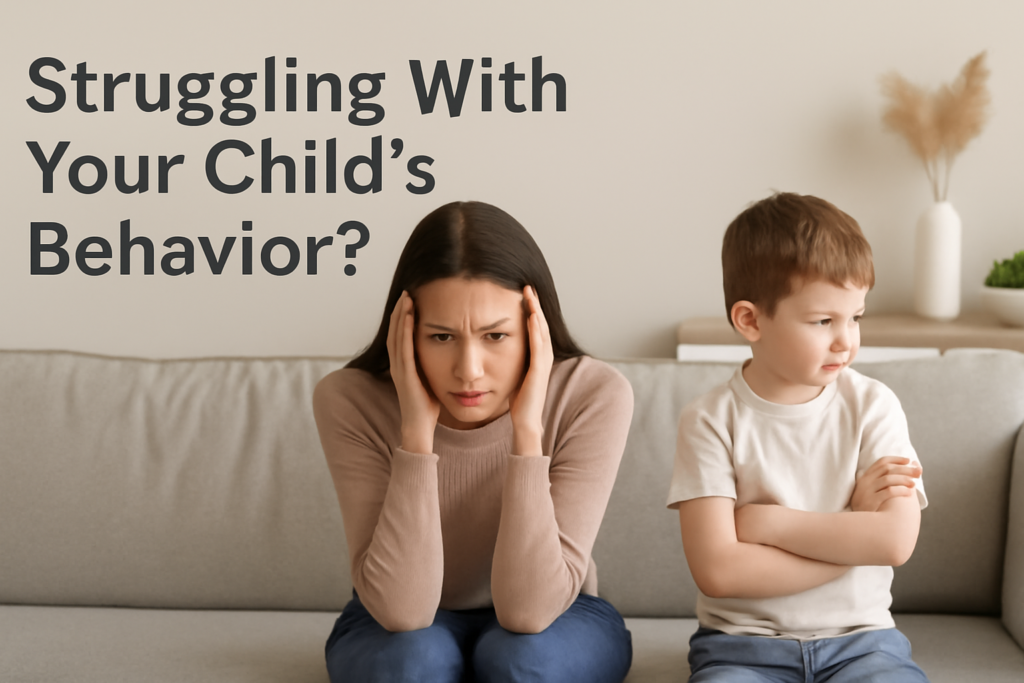Parenting is one of the most rewarding journeys, but let’s be honest—it isn’t always easy. Every parent has faced moments where their child’s behavior feels confusing, challenging, or even overwhelming. Maybe your child throws tantrums at the smallest things, refuses to follow routines, or talks back in ways that leave you speechless. Before you start doubting your parenting, take a deep breath. You’re not alone. Behavior struggles are a normal part of childhood, and with the right strategies, children can learn discipline, empathy, and self-control—qualities that prepare them for a successful future.
In this blog, our parenting expert answers common questions parents have about child behaviour, while also offering practical tips you can apply at home.
Why Do Children Misbehave?
Children don’t act out just to make life difficult for parents. Most often, behavior is a form of communication. A child might be tired, hungry, anxious, or simply craving attention. Understanding the “why” behind their actions is the first step toward resolving the issue.
For example, many parents notice that their child resists rules or chores. This could be a sign of independence developing, or it could mean the child hasn’t yet learned the importance of responsibility. Schools that balance academics with values focus on instilling discipline and cooperation in students, helping them understand why boundaries matter.
How Can Parents Set Healthy Boundaries Without Being Too Strict?
One of the biggest struggles parents face is balancing love and discipline. Too much strictness can create fear, while too little structure can lead to chaos. The solution lies in setting clear, consistent rules and explaining their purpose.
For instance, instead of saying “Because I said so,” explain why screen time is limited or why homework comes before play. When children understand the reasoning, they’re more likely to cooperate.
Educational environments should emphasize positive discipline—teaching children responsibility through encouragement, not punishment. Parents can mirror this approach at home by praising good behavior and offering gentle corrections when mistakes happen.
How Do I Handle Tantrums Without Losing My Cool?
Tantrums can be one of the most stressful aspects of parenting. They are usually a child’s way of expressing emotions they don’t yet know how to manage. The best response is to stay calm and avoid escalating the situation.
- Acknowledge their feelings: “I see you’re upset because you wanted more playtime.”
- Give choices: Instead of forcing compliance, offer simple options like, “Do you want to brush your teeth now or in five minutes?”
- Stay consistent: Don’t give in just to stop the crying; otherwise, the behavior will repeat.
Many IB schools in Bangalore also adopt emotional intelligence programs that encourage children to express feelings in healthy ways. Parents can reinforce this at home by teaching kids calming techniques like deep breathing or counting to ten.
What’s the Role of Discipline in Shaping Behavior?
Discipline often gets a bad reputation, but when applied correctly, it isn’t about control—it’s about guidance. Children thrive when they know what’s expected of them and when consequences are fair and consistent.
Research has shown that structured discipline builds resilience, self-control, and accountability. A useful resource on this topic is the Importance of Discipline, which highlights how discipline plays a major role in academic and personal success. Parents can apply this by creating routines—bedtime, study time, family meals—that give children a sense of security and order.
How Can Parents Boost a Child’s Confidence During Behavior Struggles?
Sometimes negative behavior stems from low self-esteem. A child who constantly acts out may feel unnoticed or unworthy. That’s why it’s important for parents to build their child’s confidence daily.
- Celebrate small wins—like finishing homework without reminders.
- Encourage effort, not just results.
- Allow them to make age-appropriate choices, giving them a sense of independence.
Schools often integrate this philosophy into their curriculum. Parents can explore resources such as Build Self-Confidence to understand how encouragement and validation shape a child’s personality. A confident child feels secure, respected, and less likely to misbehave.
Practical Parenting Tips You Can Start Using Today
Here are a few expert-backed strategies for managing child behaviour at home:
- Be a role model – Children imitate adults. Show kindness, patience, and respect in your daily actions.
- Create a reward system – Use stickers, stars, or small privileges to reinforce positive behavior.
- Stay consistent – Mixed signals confuse children. If bedtime is 9 PM, stick to it every day.
- Teach problem-solving – Instead of fixing every issue, guide children in finding their own solutions.
- Spend quality time – Even 15 minutes of undivided attention each day strengthens your bond and reduces attention-seeking behavior.
When schools and parents work together—like those seen in progressive institutions such as the Best International Schools in Electronic City—children get consistent reinforcement of values, discipline, and empathy both at home and in the classroom.
Conclusion
Every child is unique, and so is every parenting journey. Struggles with behavior don’t mean failure—they mean growth is happening. By understanding your child’s needs, setting healthy boundaries, and using discipline as guidance, you can raise confident, responsible, and empathetic individuals. Remember, patience is key. With consistent love and structure, behavior challenges will transform into valuable life lessons.
FAQs
- What is the most common cause of bad behavior in children?
Often, it’s a lack of communication. Children act out to express needs they can’t put into words. - How can I discipline my child without yelling?
Use calm communication, clear rules, and logical consequences instead of shouting. - At what age should children start learning discipline?
Discipline can begin as early as toddlerhood, using simple routines and gentle guidance. - How do schools help with behavior development?
Many schools incorporate programs that focus on discipline, empathy, and responsibility, complementing what children learn at home. - What should I do if my child’s behavior doesn’t improve?
If challenges persist, seek support from teachers, counselors, or parenting experts for tailored strategies.

